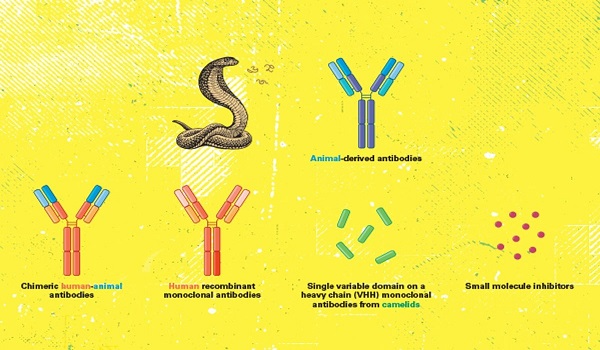Researchers at the Indian Institute of Science (IISc) in Bengaluru have created a synthetic human antibody capable of neutralising a powerful neurotoxin produced by Elapidae snakes, such as the cobra, king cobra, krait, and black mamba.Elapids, a diverse family of venomous snakes, have hollow, front fangs that deliver venom and include 300 species across various habitats globally.
New Venom-Neutralising Antibody
- The team at IISc adopted a previously successful approach for screening antibodies against HIV and Covid-19 to synthesise a new antibody, marking the first application of this strategy for snakebite treatment.
Methodology
- The team’s antibody targets a conserved region in the core of the three-finger toxin (3FTx) found in elapid venom, despite variations in this toxin among different elapid species.
- The researchers tested their synthetic antibody on animal models, finding it effective against toxins from the Taiwanese banded krait, monocled cobra, and black mamba, with a potency nearly 15 times that of conventional antivenom, even when administered after a delay following venom injection.
- Conventional antibodies are not uniform in their composition, as they are a mixture of different types of molecules with varying affinity and specificity to different epitopes of the antigen that triggered their production.
Need
- Snakebites cause thousands of deaths annually, particularly in India and sub-Saharan Africa.
- According to an Indian Council of Medical Research (ICMR) study, India has witnessed approximately 1.2 million (12 lakh) snakebite fatalities between 2000 and 2019, averaging 58,000 deaths annually.
- India accounts for almost 50% of global snakebite deaths.
- The World Health Organization (WHO) classified snakebite envenoming as a neglected tropical disease of high priority.
Application
- Researchers suggest that this advancement brings us closer to a universal antibody solution capable of providing broad protection against various snake venoms.
Other Initiatives to Prevent Snake Bite
- Much before the WHO roadmap was launched, researchers from the ICMR started community awareness and health system capacity building from the year 2013.
- In alignment with WHO’s Snakebite Envenoming Strategy and the United Nations’ Sendai Framework for Disaster Risk Reduction, India ratified a National Action Plan in 2015 to combat this issue.
- The 2022-2030 Regional Action Plan for snakebite envenoming in South-East Asia aims to halve snakebite-related deaths and disabilities by 2030, aligning with the Global Strategy, and seeks to guide Member States, WHO, donors, and partners in strengthening health systems and accelerating actions at the human-animal-ecosystem interface through various strategies and priority areas.

